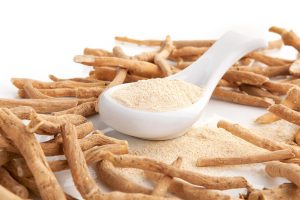Adaptogens have been part of Ayurveda for the last 5000 years. What are adaptogenic herbs?
Here we define chronic stress and how Adaptogenic herbs can help and include the best adaptogens to feel less stressed and combat adrenal fatigue, sleep better, have better focus and improved memory, and more.
What Are Adaptogenic Herbs?
The word ‘adaptogens' came from Dr. Nikolai Lazarev around 1947.
Dr. Lazarev was a Russian scientist who wanted to find herbs to help adapt to emotional and physical stress. In ancient times, people would look at plants first to improve their health.
When you’re feeling stressed out and anxious, then getting your life back in balance can be pretty challenging. Don’t be fed up with feeling ‘wired and tired’. A special group of herbs can help you regroup, refocus, and restart your body again – they are adaptable adaptogens.
Adaptogens can help you bounce back from constant stress and strain on your body, enabling you to get better sleep, focus, memory, and more.
What is Chronic Stress?

In a study, the American Psychological Association found that one-third of people live with extreme stress. Nearly half reported that their stress levels had increased over the last 5 years.
Stress hormones during stressful events are supposed to be protective. But when they over-produced because of chronic stress, those very same hormones can cause cellular damage. They speed up detrimental changes in your body and lead to things like:
- Ongoing fatigue
- Inflammation
- Bone mineral loss
- Hormone imbalances
- Brain fog
- Obesity
Adaptogens, you can say, increase the body’s natural resistance to stress. Getting rid of stress doesn’t just happen overnight. But the sooner you start managing your stress, the better off your health will be.
When you take adaptogens, you train your body to handle stress effects.
What Are Adaptogenic Herbs?
Adaptogens have a normalizing effect on the body. They support adrenal fatigue. The adrenal glands are responsible for our responses when we're under stress. When your adrenals are under stress they become exhausted.
Only one out of about 4000 different plant types is an adaptogen. For a plant to be classified as an Adaptogen, it must meet certain criteria:
- They must be safe and non-toxic
- They must have a broad scope of benefits that improve the immune system and not help with just one symptom
- They need to balance the body
- Adaptogens increase energy and endurance
- They help with balancing hormones, particularly the cortisol hormone.
In 1947 scientists outline 3 main points about adaptogens:
- They help us resist chemical, physical and biological stress
- Adaptogens have normalizing impacts on physiology
- Adaptogens don’t interfere with the normal function of an organism more than necessary
All adaptogenic plants have unique plant-based chemicals which help to steer the body to function normally. The components that promote healing vary from plant to plant.
The detailed science around adaptogens is extremely fascinating and continues to grow. The most important thing to remember is that adaptogens are wonderful food secrets to improve your energy levels, elevate your mood, and even add luster to your skin and hair.
Best Adaptogens to Feel Less Stress and to Combat Adrenal Fatigue

Indian Gooseberry
The Indian Gooseberry is also known as Amalaki. It has been eaten and used in Ayurveda for thousands of years. It is very rich in antioxidants and vitamin C, proving to treat and prevent cancer and even helping with diabetes and high cholesterol.
Ashwagandha
Like ginseng, Ashwagandha is a powerful antioxidant that benefits the nervous system, endocrine system and for cardiovascular problems. People with depression benefited from taking Ashwagandha. Ashwagandha is the ultimate cortisol balancer and thyroid supporter. Also, it can improve physical endurance.
Eleuthero
This plant shows evidence of it being used over 2000 years ago in China. It acts as a stimulant, helping to increase the functioning of the nervous system. It also increases stamina and endurance. Eleuthero has also been shown to support healthy lymphatic function. This is important because the lymphatic system delivers energy in the form of fats to all cells of your body. You might hear it referred to as Siberian Ginseng.
Rhodiola
Rhodiola strengthens the immune system, restores balance in blood sugar. It aids fertility, boosting alertness and mental clarity. Like Ashwagandha, Rhodiola supports energy and endurance. It lessens fatigue and can combat depression. It is one of the very few herbs that can give energy but also support deep sleep.
Shilajit
A resin as opposed to an herb, Shilajit is formed from the layers of rock found in the sacred Altai mountains. Shilajit is known as nature's gift to a woman. It can fight aging, fatigue, and weakness. In fact, in Sanskrit, Shilajit means “conqueror of mountains and destroyer of weakness. It has a host of vitamins, minerals, trace elements, along with Humic acid, and Fulvic acid.
Holy Basil/Tulsi
One of the most sacred herbs in Ayurveda, Tulsi is recommended to boost immunity, support strength and stamina and to enhance calm and clarity. It has anti-inflammatory and antimicrobial properties. Tulsi has been used for thousands of years to treat problems of the circulatory and immune systems as well as the nervous system.
Shatavari
This herb is probably the most important and popular with women. The word Shatavari means “a woman who possesses a hundred husbands' because it is believed to support the reproductive system and increase fertility. Shatavari is an overall tonic for all stages of a woman's cycle from menarche to menopause. It builds core vitality and the essence of immunity, vitality, and sleep.
When you look at all the above plants and their benefits, you must admit, they sound pretty amazing, don’t they? Who doesn’t want all that extra energy and to get rid of stress? All are backed by centuries of use.
It's true that certain adaptogens can help you with that much-needed vitality and energy. But, for a truly holistic approach, consider your diet and lifestyle as well if you want to receive more meaningful and long-term benefits.
Different Ways to Take Adaptogens
You can sip adaptogen teas if you like or you can mix the powdered version in anything from salad dressings to smoothies.
Of course, you can take them in capsule form as well.
While all adaptogens have hormone-balancing qualities, each has a particular strength as well. They work brilliantly by themselves but they also work synergistically with other adaptogens.
No Known Side Effects
There is not much evidence showing that adaptogens can cause health problems or side effects. But plants, as many can do, can cause allergies or gastrointestinal distress which people need to be aware of.
When you look at all the above plants and their benefits, you must admit, they sound pretty amazing, don’t they? Who doesn’t want all that extra energy and to get rid of stress? All are backed by centuries of use.



